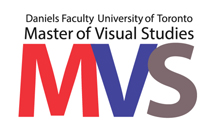
March 10 - 12, 2015
At multiple sites at the University of Toronto Mississauga (UTM) campus
Presented in the context of Comfort Zones, a research-creation project produced as part of the requirements for the MVS degree in Curatorial Studies at the University of Toronto
.
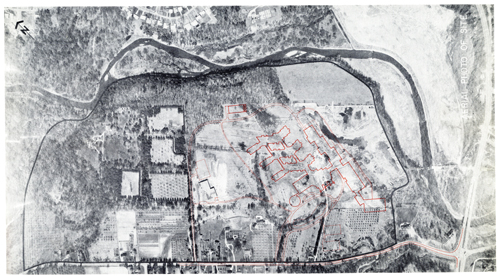
Comfort Zones is a unique curatorial proposition. Strategically, it skips over the conventional presentation of an exhibition and replaces it with a year-long experimental research program designed to study the complexities and potentials of a university campus. The project is informed by Cohabitation Strategies (CohStra), a non-profit cooperative for socio-spatial research, design, and development based in various international cities. The first stage of Comfort Zones took place in July 2014 when CohStra members Lucia Babina and Miguel Robles-Durán led a series of participatory workshops at the University of Toronto Mississauga campus with students, staff, faculty, and community members. Through the lens of urban theory, the workshop included presentations on CohStra’s transdisciplinary approach to facilitating transformative social projects, physical explorations of public spaces on UTM campus, and roundtable discussions on how the potential for public engagement and collective use of these spaces can be re-examined and re-imagined.
The second stageof Comfort Zones will take the form of four “behind-the-scenes” walking tours to trace the visible and invisible forces that have transformed the campus since its inception. The tours will be led by a cross-section of UTM community members (faculty, students, and staff) who will share their professional knowledge and personal experiences of the campus, as well as their visions for its future.
Living and Working
Tuesday, March 10th, 3pm – 5pm
Linda Stroble, staff member of Chartwell’s food service team, will lead a tour “down memory lane” to re-visit the food service stations she has worked at over the course of her twenty-five years at UTM. Some are still operational while others have disappeared to make room for the new. Linda’s tour will be punctuated by a few stops at her favourite “hideaway” spots where she has found peace and joy between shifts.
Natural traces
Wednesday, March 11th, 10am – 12pm
Michael Brand, historical archaeologist and Sessional Lecturer in the Department of Anthropology, will relay his research interests into a historical tour of the campus and the urban forest surrounding Lislehurst (used today as the Principal’s residence). The expedition will unearth physical traces dating back to the early nineteenth century to explore how previous owners of the property lived and altered the land.
Student Culture
Wednesday, March 11th, 3pm – 5pm
Members of UTM EDSS (English and Drama Student Society) view the campus as a movie set. President of EDSS, Siddharth Singh Chaudhari, will lead a tour of where and how EDSS TV creates self-produced short films on campus, while offering a sneak-peek (in action!) of the current production Shattered, a 30-minute psychological horror.
Material and Immaterial
Thursday, March 12th, 10am – 12pm
Paul Donoghue, Chief Administrative Officer of the University of Toronto Mississauga, will conduct a tour of new architectural landmarks on campus, while sharing his insights into the University’s master plan and how public spaces on campus are envisioned from the administration’s perspective.
Each tour will be followed by a mapping exercise facilitated by CohStra where participants will reflect on the tour experience and collectively re-chart the campus through a congruency of personal and institutional narratives. The results of this group activity will be compiled and translated into a single map that will be made public at a later date. Stay tuned!
Behind the Scenes is designed to explore the networks of social relations and the collective uses of space on campus and their combined potential for knowledge production and exchange.
To register for one or more tours, email yw.wu@mail.utoronto.ca by Friday March 6, 2015.
Spaces are limited. Current graduate and undergraduate students, recent grads, faculty, researchers, administrators, service workers, artists, architects, curators, and designers are encouraged to participate.
FREE
All tours will start at the Blackwood Gallery, Kaneff Centre.
Cohabitation Strategies (CohStra) is a non-profit cooperative for socio-spatial research, design, and development based in New York City, Rotterdam, and Ibiza. CohStra was founded in the city of Rotterdam – right after the 2008 financial crash – by Lucia Babina, Emiliano Gandolfi, Gabriela Rendón and Miguel Robles-Durán. Since then, CohStra has initiated operation centers in various cities across Europe, South, and North America. Its action research endeavors to facilitate transformative and progressive urban intervention projects. This is undertaken through the active engagement with a range of locally embedded actors from governments, municipalities, cultural institutions, non-profit organizations, and civic groups to researchers, artists, designers, and independent activists that coalesce around the desire for social, spatial, and environmental justice – in short, the Right to the City.
For more information on what they do, visit: www.cohstra.org.
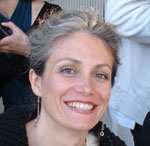
Lucia Babina is a cultural activist whose focus is on research and reactivation of sustainable ways of cohabitation and coexistence. Her aim is to reflect on the current global unevenness and injustice by means of collective and artistic processes. She is co-founder of Cohabitation Strategies. She is also co-founder of iStrike and iStrike.ultd in Rotterdam, an environmental organization aimed at creating multidisciplinary platforms of analysis, comparison, and international exchange. With iStrike and Strike.ultd she co-produced projects such as: Ars&Urbis International Workshop (Douala, Cameroon, 2007), Salon Urbain de Douala (Douala, Cameroon, 2007), Moving in Free Zones #1 and 2 (Rotterdam, The Netherlands, 2007 and 2009), Talking About! (Rotterdam, The Netherlands, 2009). She is co-author of The Cook, the Farmer, His Wife and Their Neighbour as part of Stedelijk Goes West (Amsterdam, The Netherlands, 2009); Market Academy Naschmarkt as part of Wiener Festwochen (Vienna, Austria, 2010); TheBrantClub as part of Musagetes’ Guelph Program (Guelph, Canada, 2012). Babina has been giving lectures and writing contributions for several international platforms.

Miguel Robles-Durán, an urbanist, is Director of the Urban Ecologies graduate program at the New School/Parsons in New York City, and Senior fellow at “Civic City”, a post-graduate design/research program based in HEAD - Geneva, Switzerland. Robles-Durán has wide international experience in the strategic definition/coordination of trans-disciplinary urban projects, as well as in the development of tactical design strategies and civic engagement platforms that confront the contradictions of contemporary urbanization. He recently co-edited/authored the book Urban Asymmetries: Studies and Projects on Neoliberal Urbanization that reviews the dire consequences that neoliberal urban policies have had upon the city and discusses possible alternatives to market-driven development. Robles-Durán’s areas of specialization are design/research interventions and strategies in uneven urbanization and areas of social urban conflict, urban political-economy, and urban theory.
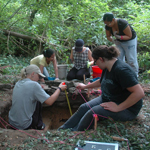
Michael Brand is a historical archaeologist and Sessional Lecturer in the Department of Anthropology (UTM).
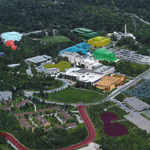
Paul Donoghue served as UTM’s Chief Administrative Officer from 2001-2004 and returned in 2009. As part of his responsibilities, the CAO acts as the “Owners Representative” for all major construction projects. UTM has grown from about 5,500 students in 2004 to over 14,000 in 2014. Over that same period and in keeping with the UTM’s updated Campus Master Plan, nine major buildings have been added to the campus’ 2.5 million square feet of built space, with more additions in the works. Prior to returning to UTM Paul was the Vice-President, Planning and Administration for the American University in Cairo (AUC) where his responsibilities included the construction of an entirely new campus of more than 20 buildings on a 250-acre site in the suburbs of Cairo.
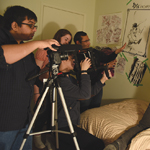
EDSS TV is an initiative launched in March 2014 by President of the EDSS, Siddharth Singh Chaudhari. It provides UTM students with funding support and resources towards the production of original short films. These short films are submitted to Canadian film festivals, and are also used by students as portfolios for graduate school and employment opportunities. Over 50 UTM students have had their first experiences with filmmaking through EDSS TV. EDSS TV is currently working on four small productions.
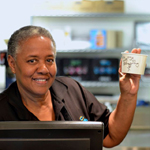
Linda Stroble emigrated to Canada from Bermuda in 1971, and over the past twenty-five years has been working at various locations at UTM campus through the food service team. Nowadays, you can find her at Circuit Café in the CCT building. She loves music, dancing and people.
Comfort Zones is a curatorial proposition conceived by Yan Wu. Strategically, it skips over the conventional presentation of an exhibition and replaces it with a year-long interdisciplinary, participatory, and experimental research program designed to study the complexities and possibilities of commissioning public art in a university context, from the selection of the site to the consideration of the work’s publicity, to the potential for public art to re-generate a collective ethos that has faded into the haze of Neoliberalism. The project explores three lines of inquiry: 1) What is a comfort zone: a physical site, a state of mind, a mode of operation, or a combination of all of the above? 2) How are comfort zones configured in an institutionalized environment such as a university and how are they shared among distinct user groups with different interests, privileges, and access? 3) Can new comfort zones be activated on campus through informal learning and collective knowledge production?
Curatorial research notes are shared at: http://utmcomfortzone.tumblr.com/.
Formerly trained as a computer programmer, Yan Wu is a Shanghai-born and Toronto-based curator. Her practice contemplates the interplay of public art, architecture, and urban design. She has collaborated with arts organizations including Gendai Gallery, Art Metropole, Justina M. Barnicke Gallery, and Gallery 101. In 2012, she initiated and curated a year-long spatial and institutional experiment titled Gendai Workstation with a team of like-minded interdisciplinary collaborators. The project received a special jury award at the 25th Images Festival, and subsequently dissolved and transformed itself into an on-going landscape of mobile organization strategies: a moveable unit of modular furniture, a tote bag, and a library that privileges relations to book titles. She recently co-curated the Canada Pavilion with Janine Marchessault at the 5th Bi-city Urbanism/Architecture Biennale in Shenzhen China. Currently, Wu is an MVS candidate in Curatorial Studies at Daniels Faculty of Architecture, Landscape & Design at the University of Toronto.
Urban Field Speakers Series
Talk by Cohabitation Strategies (Lucia Babina and Miguel Robles-Durán), moderated by Yan Wu
Thursday March 12th at 7:30pm
Prefix Institute of Contemporary Art
401 Richmond St. West, Suite 124 (Toronto)
Tickets: $12 (or $8 for Prefix Photo subscribers, students & seniors)
For more information, please click here.
Presented by Prefix ICA, in partnership with the Blackwood Gallery, University of Toronto Mississauga.
This research project is being produced as part of the requirements for the candidate’s MVS degree in Curatorial Studies at the University of Toronto and supported in part by the Department of Visual Studies (UTM) through the Graduate Expansion Fund, as well as Student Housing and Residence Life (UTM).

![]()

